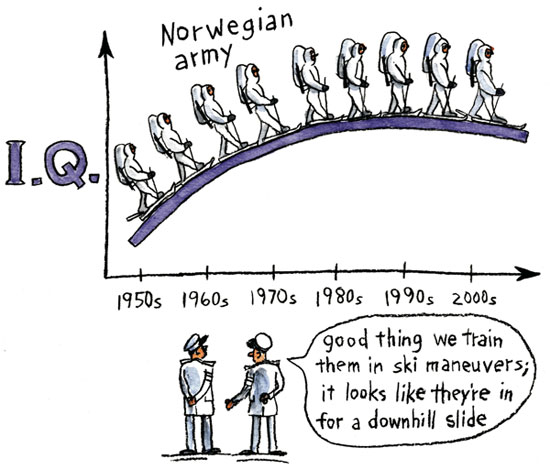Smart as We Can Get?
By David Schneider
Gains on certain tests of intelligence are ending in some places
Gains on certain tests of intelligence are ending in some places

DOI: 10.1511/2006.60.311
Psychometricians have long been aware of a phenomenon called the Flynn effect—a widespread and long-standing tendency for scores on certain tests of intelligence to rise over time. The effect is most pronounced in tests of so-called fluid intelligence, such as those that require the subject to identify the missing element in an array of figures. In the early 1980s, James R. Flynn, now an emeritus professor at the University of Otago in Dunedin, New Zealand, found strong evidence for this trend when he compared some newly introduced IQ tests with the older versions they replaced: When the same people took both tests, they appeared smarter when scored on the older exams compared with the new. If results were not continually normalized so that the mean score was 100, the IQ of test-takers would rise over time—and by a large amount: about 3 points or more per decade.
Ever since Flynn published his startling results, psychologists and educators have struggled to figure out whether people really are getting smarter and, if so, why. No clear answer has emerged. And now they have another curiosity to ponder: The tendency for intelligence scores to rise appears to have ended in some places. Indeed, it seems that some countries are experiencing a Flynn effect with a reversed sign.

Tom Dunne
The strongest indications have come from Scandinavia. In 2004, Jon Martin Sundet of the University of Oslo along with two colleagues from the Psychological Services branch of the Norwegian Armed Forces published a article in the journal Intelligence documenting the evolution of scores on intelligence tests given to Norwegian conscripts between the 1950s and 2002. Although the first two decades of testing produced ever-better results, consistent with the ubiquitous Flynn effect, gains began to slow in the 1970s and '80s, and the increase in scores of general intelligence stopped after the mid-1990s. Scores on tests of arithmetic skills in particular began to slide distinctly backward after that time.
Last year, Thomas W. Teasdale of the University of Copenhagen and David R. Owen of Brooklyn College, City University of New York, discovered similar goings-on in nearby Denmark. They, too, looked at tests of intelligence given to military recruits (which for Denmark means just about all 18-year-old men). And they also found that overall scores, which had been rising for decades, reached a plateau. "Across the ‘90s, all of the tests stagnated," says Teasdale, referring to the four separate tests given to these men: one involving logical reasoning, another using verbal analogies, a third on completing number series and a fourth test of spatial ability that used geometric figures.
Further indications that scores on intelligence tests are not universally climbing have come from the United Kingdom. In an article soon to be published in the British Journal of Educational Psychology, Michael Shayer, a psychologist at King's College, University of London, and two colleagues report that performance on tests of physical reasoning given to children entering British secondary schools declined markedly between 1976 and 2003.
The test at issue here, based on a methodology pioneered by the Swiss developmental psychologist Jean Piaget, involved asking students to reason about the conservation of liquid and solid materials, the conservation of internal volume and volume displacements—a battery known as the Piagetian volume-and-heaviness tests. Shayer and his colleagues found a rather astounding, 25-percentile-point decline in the last quarter-century. "The kids now at 11 years and 10 months are doing as well as the eight- to nine-year-olds in 1976," Shayer explains. Shayer posits that a distinct shift in the environment is at work—in particular, diminishing amounts of experiential play. "They're glued to bloody computer games," he laments, adding that "the food computers offer children is thin gruel indeed."
Flynn himself is much less gloomy about what appears to be happening. For one, he points out that the situation varies quite a bit from country to country. "All the evidence is that the IQ gains in America are still robust, " he says. And he notes that at the very time that scores were declining in the UK on the Piagetian tests that Shayer examined, British kids were making gains on a test called the Wechsler Intelligence Scale for Children or WISC. Flynn points out that results gathered with two versions of this test (WISC-III, introduced in 1991, and WISC-IV, in 2003) show the usual effect, a rise in raw scores over time. But he also notes that one subtest—on arithmetic reasoning—did show a decline.
Although Flynn cautions against generalizing the recent Danish and Norwegian experiences, he anticipates similar results will crop up elsewhere in the world. But he's not glum about it. Flynn is convinced that the cause of his eponymous effect has to do with changes in the environment that allow children more opportunity to exercise the kinds of skills probed in today's intelligence tests—changes like a shift to smaller family sizes, which allow parents more time to interact with each child, for example, or devotion of an ever-greater portion of kids' leisure time to abstract, mentally demanding games. He points out that in industrialized, middle-class countries (like those of Scandinavia), such influences must be reaching a point of saturation: "You can't really get the family much smaller than one or two kids." And the current craze for Sudoku puzzles not withstanding, as Flynn says, "eventually, people do want to relax."
Click "American Scientist" to access home page
American Scientist Comments and Discussion
To discuss our articles or comment on them, please share them and tag American Scientist on social media platforms. Here are links to our profiles on Twitter, Facebook, and LinkedIn.
If we re-share your post, we will moderate comments/discussion following our comments policy.